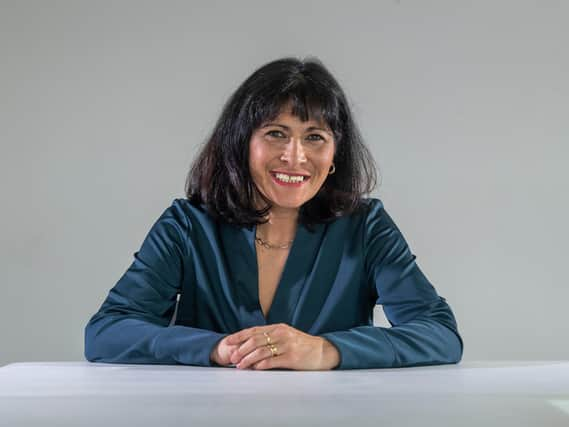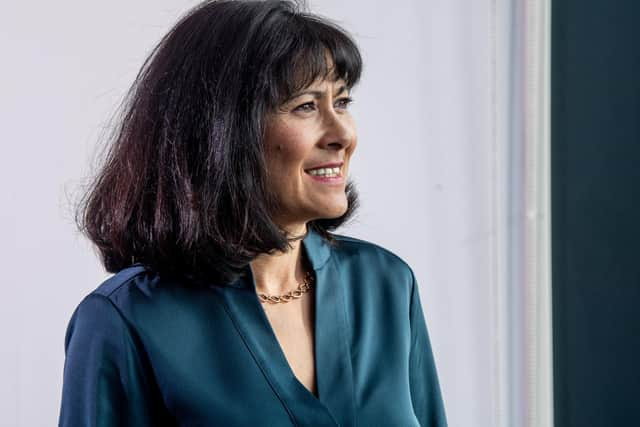Meet the boss who is protecting victims of drug abuse and sexual coercion around Britain


As a young, enthusiastic GP, Linda Harris was keen to make a positive impression as she headed out to meet her new patients in Pontefract.
Ms Harris had just arrived from the East End and hoped the locals in her new home would warm to her. She need not have worried.
Advertisement
Hide AdAdvertisement
Hide Ad“My first home visit as a GP was to an old man with whippets,’’ she recalled. “As I left he gave me a huge bag of sweets straight from the Liquorice Allsorts factory. It was quite a welcome to Yorkshire.”


Today, she is the chief executive of Spectrum Community Health CIC, a social enterprise that delivers a range of healthcare services to vulnerable people. Spectrum is a Community Interest Company, a form of social enterprise, which means any surpluses are ploughed back into initiatives and projects that improve public health.
For example, Spectrum delivers sexual health services across Wakefield, Barnsley and Wigan Borough. It also provides relationship and sex education in schools and is responsible for a sexual coercion prevention programme aimed at young women and girls.
Ms Harris cut her teeth working in the East End having trained at The London Hospital in Whitechapel. She worked as a GP trainee in Newham and moved to Yorkshire because her husband Gareth, who is also a doctor, got a job at St James’s Hospital in Leeds.
Advertisement
Hide AdAdvertisement
Hide AdHer mother was part of the Windrush generation who came over to the UK in the 1960s to work as a nurse.
Ms Harris said: “She worked in the health service for 30 years. It showed me the importance of public service.”
“Nobody in my family had studied medicine before me,’’ Ms Harris said. “My family are from the Midlands but medical school meant I had to move to London and I ended up working as a GP in Newham.
“I always thought I would be an East End GP,’’ she added. “In the East End diversity was innate within the population, I had to learn Bangladeshi to get by and I also met East End guys who knew the Krays.”
Advertisement
Hide AdAdvertisement
Hide AdSoon after arriving in West Yorkshire, she found herself at the heart of a crisis driven by drug abuse.
“Heroin had come to Wakefield in the late 1980s and 1990s,’’ she recalled. “Suddenly GPs found people coming through the door with heroin problems.”
“There was a very small body of expertise in dealing with heroin at the time. The problems were flooding through GP’s doors and the accompanying headlines were ‘the streets are awash with methadone’.
“We didn’t quite know what it was, in the early days a lot of GPs found themselves having to prescribe methadone without good solid guidance.
Advertisement
Hide AdAdvertisement
Hide Ad“That’s how I got involved in developing what has become the national RCGP training programme for substance misuse. We run it to this day and have trained hundreds of doctors and nurses in managing drug and alcohol problems.”
She and her colleagues grew the service from the ground up - starting with the needle exchanges and harm reduction schemes, often learning from the patients themselves. Ms Harris said it was this exposure to health inequality which changed her life. It is why she decided to play a role in setting up drug treatment services in Wakefield.
“I decided to become a full time clinical director.,’’ she added. “My passion was to get GPs to develop a special interest and, when there was more funding available, support the development of shared care services, which means GPs working with addiction services to provide care close to home.
“The challenge for me was trying to distribute expertise and break down the barriers caused by the stigmas associated with drug abuse.
Advertisement
Hide AdAdvertisement
Hide Ad“The stigma is as strong as it has ever been. There has been a terrible tide of drug-related deaths in our deprived communities.”
In recent years, the GP “shared care” model has not been regarded as being as cost effective as the centralised model. Ms Harris described this as a huge shame because it fails to see the bigger picture.
She added: “We need services that vulnerable people with chaotic lives, many of whom have experienced serious trauma, can access easily. They are just as deserving as anyone else
“My ultimate goal has always been to put the patient at the centre, breaking the stigma and the inter-generational cycle. More people have to think, ‘There but for the Grace of God go I.’”
Advertisement
Hide AdAdvertisement
Hide Ad“There is often an innate happiness and resourcefulness in the most challenged communities that you have got to tap into. You have got to look at the potential and how you imbibe hope and a sense of purpose . It can be contagious .”
Spectrum provides a range of services for vulnerable people across the North of England.
She said: “We started with 100 staff and come April we will have 800. We have some stunning, passionate staff working in community health and justice and sexual health . We have 13 prison sites covering all categories - we do the whole gamut of health and social care.
“It’s an extremely well regulated and a highly scrutinised environment and incredibly challenging.
Advertisement
Hide AdAdvertisement
Hide Ad“It has huge rewards and as a social enterprise we are always looking for ways in which we can add social value, support our local communities and give something back.”
Ms Harris is proud to have built a career acting as an advocate for the vulnerable and powerless.
“You have to realise that if you have knock backs, there will always be a solution,’’ she added. “When you think one door has shut, you find another one open.”
Dr Linda Harris, is the Chief Executive of Spectrum Community Health CIC.
Advertisement
Hide AdAdvertisement
Hide AdA former Wakefield General Practitioner and clinical director, she has championed the needs of vulnerable people for almost two decades.
She is a trustee of Spectrum People, and is a Fellow and Medical Director of Substance Misuse and Associated Health for the RCGP (Royal College of General Practitioners).
Spectrum runs sexual health, substance misuse, health and wellbeing campaigns.
The clinically-led and employee-led model means Spectrum gives staff an influence in the way the organisation is run and managed.